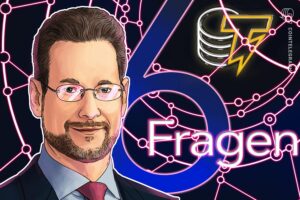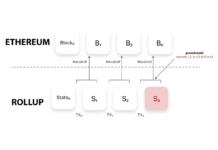
Cointelegraph Year End Interview with Dr. Daniel Diemers
1. What do you think are the reasons for the current crypto winter?
This can be explained by two major developments. On the one hand, 2021 was clearly an overheated year: Grayscale, Microstrategy, Elon Musk’s Dogecoin, One River, Tudor, the IPO of Coinbase. One positive news followed the next. Many investors thought: from now on, things will only go up exponentially.
That the ecosystem is still quite fragile was seen in the last few months: the collapse of FTX, Terra Luna, Coinflex, Three Arrows Capital, Celsius and others shows that some were not prepared for downward movements of the markets.
On the other hand, we are at a point where cryptocurrencies are now very strongly correlated with traditional markets, i.e. when they correct downwards, as they are doing now, cryptocurrencies follow suit. In 2014, this correlation thesis was still considered absurd (including by myself, I was wrong there!), but we are now almost inextricably linked to the international equity markets, also thanks to institutional investors.
2. Is the crypto winter of 2022 different from that of 2018? (If so, please explain why).
I think so. In 2018, we woke up from a deep ICO fever and wondered how it all happened. The answer, of course, was: hardly any regulatory hurdles (KYC, AML), lots of speculative money and 90, maybe even 95% of the projects were clearly classifiable ex ante as “hopeless” if you had looked at them more closely and with proper due diligence.
In 2022 we are in a different, better place. Digital assets, especially cryptocurrencies, will be regulated like financial markets, which I predicted back in 2014. Institutional investors are now getting involved, who know and understand the ups and downs of exchanges very well. And the innovation of the startup ecosystem and industry adoption around blockchain is much further along than we were in 2018. Cue NFTs, Metaverse, but just crypto payments via apps and neobanks: everything is now easier, more elegant, more secure.
3. How long will the crypto winter last?
Due to the close correlation with traditional markets, it will probably only take 2-3 months of strong upward movements in the leading indices, initial solutions to the European energy crisis and more geopolitical calm, and then momentum will quickly return to digital assets. In my opinion, the so-called “fundamentals” are still positive and in place. In my experience, crypto winters also have a positive effect in the start-up environment: weak, unrealistic ideas disappear virtually overnight, and the good quality projects come out of the winter stronger and better.
4. What does decentralization mean to you, and why is it important?
Decentralization is a wonderful concept, but also a myth. As a Swiss living in a well-functioning federal democracy, I strongly believe in decentralization, but I also see that certain things are better managed centrally. The right balance centralized-decentralized make the concept successful.
This is also true for blockchain technology. I don’t think we will see massively scalable use cases – e.g. in industry & logistics, smart cities or the metaverse – where Blockchain is fully decentralized with no central “command” and ownership. In the end, it needs someone to take responsibility, someone to pick up the phone when there’s a problem. Someone to look after development. Blockchain is simply IT, and IT needs maintenance. If you have a large, global community that will crowdwork and maintain open source protocols, that may work. But we’ve seen communities shift away, fork, lose interest, feel scammed. So it’s a fine balance, and for industry adoption we need strong, stable partners and communities to make blockchain tech come alive at scale.
5. What do you think will be the biggest trend in blockchain over the next 12 months?
By a large margin it will be the Metaverse. It’s right up there in the Hype Cycle now, probably 12-18 months before the first big disillusionment. As we have seen a few times with other blockchain topics: ICO’s, tokenization, DeFI. But the momentum of the metaverse is huge: if it took 5-6 years for banks to be the first to jump on the crypto bandwagon, today big names and brands are helping shape the metaverse. So are blockchain devs, social media influencers and content creators. Not to speak of the global gaming and eSports industry. The Metaverse is alive, it’s colorful, and thanks to Blockchain, assets can be safely stored, traded, or used across Metaverse worlds.
6. What would you like to see tokenized? When, if ever, would you expect this to happen?
I am big fan of 8-bit computer demos, which were popular in late 80’s, early 90’s and formed a global community. This digital art form has survived to this day, and the international fan community meets regularly for competitions and reunions. In a technology world where graphics cards, memory and processors are getting dizzyingly and exponentially better, I find it fascinating to achieve creativity despite technical limitations.
7. Have you ever bought an NFT? Which one was it? And if not, what do you think your first one will be?
Yes, of course. I am an avid collector: art NFTs, collectibles, Play-To-Earn. With friends from Manila, Singapore, Dubai, Zug and Basel, we started a small NFT art collection in the summer of 2021: SNGLR.NFT. Besides the usual “blue chips”, we enjoy exchanging with little known artists with whom we then realize joint projects. My current favorite NFTs are for example the Aoki avatars at Sandbox, super cool, or the 0xMusic audiovisual DJ samples that generatively remix themselves every time you call it up. So you hear and see the same track only once. Really cool.
8. Is there anything in your life that you avoided out of fear and now regret?
I once wanted to be a tech futurist, a professor at a university, giving lectures, predicting trends, writing books. But after 3 years of working on my dissertation on virtual communities, I got tired of writing and became afraid of missing something “out there.” But of course I’m happy with what I’m doing today. Sometimes you have to listen to your inner voice, or not.
9. Which book (or books) did you read during your vacation? Is it / are they recommendable?
Recently again the classic: “Neuromancer” by William Gibson. Probably for the 7th time. Thanks to this book, we are now sitting here probably at this interview. It had a great impact on me:
Gibson was one of the best in cyberpunk, an excellent writer, and a visionary thought leader – not only for the metaverse, the matrix, cyberspace, or whatever you want to call it, but also cyborg lifestyle, satellite-based internet. Artificial intelligences and big tech companies. If you haven’t read Neuromancer yet, you should have it put under your Christmas tree.

Interview initially done in German language with Cointelegraph.de
LINK: https://de.cointelegraph.com/news/6-questions-for-daniel-diemers-co-founder-of-snglr-group



